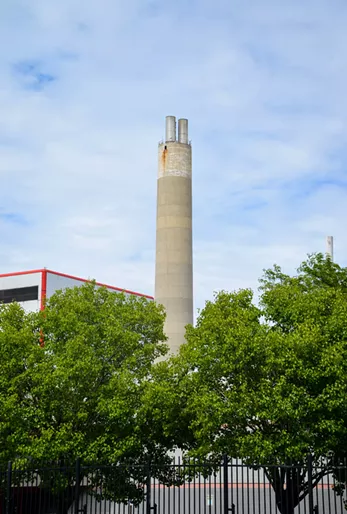Well, this should resolve some concerns — at least, for now.
A year after negotiations began to resolve the odor emanating from the Detroit incinerator at the interchange of I-75 and I-94, a deal has been reached that should make the air in Midtown smell a bit nicer. The Michigan Department of Environmental Quality (MDEQ) and Attorney General Bill Schuette's office confirmed a settlement announced last week with the companies that operate the incinerator, Detroit Renewable Power (DRP) and Michigan Waste Energy, Inc.
The decision to hatch a consent judgment stems from years of complaints from Detroit residents who say that living near the incinerator is, at times, unbearable. Why?
It stinks. The state has issued 17 citations against DRP due to a persistent odor that affects residents in Midtown and Poletown since DRP took over the facility, the largest of its kind in the nation, in 2010. During that same period, the state has logged over 170 odor complaints from residents, according to Schuette's office; in 2008, it received only four.
It’s likely that increase can be attributed to the efforts of groups like Zero Waste Detroit, which called a community meeting last week to receive an update from the MDEQ on its enforcement action with DRP. As Metro Times reported in a cover story on the facility’s odor problem this summer, the MDEQ began hashing out a consent judgment with DRP last fall. Such a judgment is essentially an agreement between two parties to settle a matter that is crafted in concert with the Michigan attorney general’s office.
"I am confident Detroit has a better, brighter future ahead as we continue to see economic improvement in the Motor City,” said Schuette, in a statement Tuesdy. “Investing in Detroit is important, but we must also prioritize the quality of life of Detroit families and business owners.”
At the community meeting, Joyce Zhu, MDEQ inspector, brought good news for Zero Waste Detroit and attendees: After a yearlong wait, DRP had finally come to an agreement with the state on terms of the judgment. As part of the settlement, Schuette's office said Tuesday that DRP and Michigan Waste will:
- Re-engineer the facility by the end of 2016 with a new air ducting system, "sending foul-smelling air into the incineration process for destruction.
- Pay a $5,000 fine per day for any future violations under Michigan's Air Pollution Control Law;
- Pay a $350,000 fine to resolve the past odor violations; the money will be deposited into Michigan's General Fund.
Margaret Weber, convener of Zero Waste Detroit, said in an email to the Hits that, although it's a positive change to see the settlement finalized, the two-year timespan affords serious flexibility to DRP.
"While pleased that DEQ has finalized the Consent Agreement with MWE and DRP, and continued with due diligence, the timeline appears to be very generous to the defendants," Weber said. "The well-being of the community will require rigorous attention to the outlined deadlines and stipulations."
Ever since the incinerator came online in the 1980s, residents and activists have raised hell over it. Namely, burning trash carries an exceedingly high cost for Detroit, and the facility’s impact on the environment generates alarm among many. For instance, asthma rates in the immediate area surrounding the behemoth are 2.5 times that of the state, according to Data Driven Detroit.
The facility processes as much as 3,300 tons of trash per week at temperatures higher than 2,300 degrees. Its furnaces create steam that’s purchased by DRP’s sister company, Detroit Thermal, to heat and cool more than 140 buildings between downtown and New Center. The company is permitted to receive as much as 20,000 tons of municipal solid waste per week, according to the state.
Worse, the structure sits in what happens to be one of Detroit’s fastest growing areas. For a bankrupt city that's trying to find ways to grow its tax base, it’s probably not in Detroit’s best interest to keep operating a smelly trash burner.
And you don’t need to take our word for it: Hundreds of documents on file with the MDEQ highlight complaints from residents as far away as Corktown waging complaints against the facility’s odor. Even though DRP says the smell could be coming from other nearby facilities, MDEQ investigators, time and again, verify through documented investigations how they confirmed the source was unquestionably the Detroit incinerator.
Now, the judgment might've been bad news for DRP’s bottom line, but the company also has other issues to deal with: A hearing on a class-action lawsuit filed by residents in Wayne County Circuit Court against DRP is set to take place later this month. The suit seeks financial awards in excess of $25,000, due to the "noxious" odors caused by the incinerator, according to the complaint.
But for now, residents can chalk up one victory: At the very least, the city might be on track to having a less odorous community.
You can read the entire consent judgment below.
Update: This story has been updated from the version in this week's Metro Times; the announcement of the confirmed settlement from the state came after the paper went to press.








